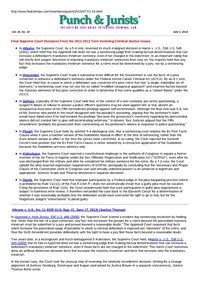Loaded on
July 1, 2013
published in Punch and Jurists
July 01, 2013
This decision involved the interrelationship of two provisions of Rule 11 of the Fed.R.Crim.P., which governs guilty pleas. Rule 11(c)(1) states that “[t]he court must not participate in [plea] discussions.” Rule 11(h), in turn, states: “A variance from the requirements of th[e] rule is harmless error if it does …
Loaded on
July 1, 2013
published in Punch and Jurists
July 01, 2013
In an important sentencing decision involving the scope of the Armed Career Criminal Act (“ACCA”) (18 U.S.C. § 924(e)), the Court emphatically cut back on the ability of prosecutors to use factual determinations relating to prior convictions to dsedtermine whether prior convictions qualify as a "violent felony" or a …
Loaded on
July 1, 2013
published in Punch and Jurists
July 01, 2013
The U.S. Sentencing Guidelines Manual directs a court to “use the Guidelines Manual in effect on the date the defendant is sentenced” (U.S.S.G. § 1B1.11(a)), unless the court “determines that the use of the Guidelines Manual in effect on the date that the defendant is sentenced would violate the …
Loaded on
July 1, 2013
published in Punch and Jurists
July 01, 2013
In 1999 a special court-martial convicted Anthony Kebodeaux, a member of the United States Air Force, of statutory rape for having consensual sex with a 15-year old girl; and it imposed a sentence of three months' imprisonment and a bad conduct discharge. Kebodeaux later moved to San Antonio, Texas …
Loaded on
July 1, 2013
published in Punch and Jurists
July 01, 2013
In a decision that is noteworthy mostly for its continued erosion of criminal defendant’s Miranda rights, a plurality of the Court held that, in the context of a non-custodial, pre-arrest questioning, a person’s silence may be used against him absent an unequivocal invocation of his Fifth Amendment privilege against …
Loaded on
July 1, 2013
published in Punch and Jurists
July 01, 2013
In Apprendi v. New Jersey, 530 U.S. 466 (2000), the Supreme Court started a modern day sentencing revolution by holding that "other than the fact of a prior conviction, any fact that increases the penalty for a crime beyond the prescribed statutory minimum must be submitted to a jury …
